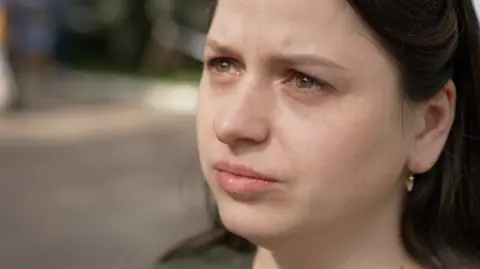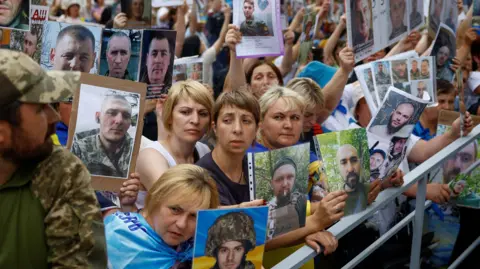Families of missing Ukrainians gather as prisoner exchange begins
 Reuters
ReutersThe families of missing Ukrainian soldiers gathered close to the border with Belarus on Monday, as a planned prisoner swap between Russia and Ukraine took place.
As the bus carrying prisoners of war arrived, a crowd of relatives surged forward, many brandishing photos of missing fathers, brothers and sons.
Faces were filled with apprehension. Few expected to be reunited, and most were just desperate for information after waiting years for any news.
During the latest round of direct talks in Turkey last week, the two warring sides agreed to exchange sick and heavily wounded prisoners of war, those aged under 25, and the bodies of 12,000 soldiers.
Ukraine's President Volodymyr Zelensky said the exchange would unfold "in several stages" over the coming days.
Writing on Telegram, he said: "The process is quite complicated, there are many sensitive details, negotiations continue virtually every day."
Russia's defence ministry said "the first group of Russian servicemen under the age of 25 were returned from the territory controlled by the Kyiv regime" and that a "similar number" had been returned to Ukraine. Neither side provided an exact figure of how many people had been exchanged.
As with past exchanges, Moscow said the repatriated Russian soldiers were receiving psychological and medical assistance in Belarus.
Officials in Kyiv said some of the Ukrainian prisoners who returned on Monday had been in Russian captivity since the beginning of the war.
Tetiana, who had gathered with other Ukrainians in the Chernihiv region close to Belarus, carried a cardboard sign with photos of her father, Valentyn, and cousin, Mykola, both still missing.
"When my father went to fight, my biggest fear was that he would go missing," she said, her eyes filling with tears. "I hoped maybe he'd be wounded and come back."
The war has exacted a heavy toll on the family. Tetiana's uncle was killed last September, but his body was only recently returned for burial.

When one of the returned prisoners appeared at an upstairs window, women waiting below hurled the names of regiments at him, hoping he might have news.
He apologised, made a heart sign with his hands and called out "slava Ukraini" - glory to Ukraine. "Heroiam Slava" - glory to the heroes - the crowd replied in unison.
Glimpsed briefly through the crowd as they were escorted inside, some of the soldiers looked gaunt.
"They spent a lot of time in Russian places of detention, without any visits of International Red Cross," Petro Yatsenko, of Ukraine's Coordination HQ for prisoners of war, told the BBC.
"Their health conditions are very poor. They have not had sufficient food. Of course they need a long period of rehabilitation."
But 23-year-old Valera, back on home soil after three years and three months of captivity, seemed happy enough after a bowl of Ukrainian soup.
As he turned to leave, women pressed forward, pushing pictures of the missing into his arms, hoping he might recognise someone.
 Reuters
ReutersLast week, Moscow and Kyiv accused each other of disrupting the planned repatriation of the bodies of dead soldiers.
Russia said that the bodies of more than 1,000 Ukrainian soldiers had been taken to an agreed exchange point but that Ukrainian officials had never arrived. Ukraine accused Moscow of "playing dirty games" and alleged that Russia was not sticking to the agreed parameters of the swap.
In late May, Russia and Ukraine each handed over 390 soldiers and civilians in the biggest prisoner exchange since Russia launched the full-scale invasion in 2022.
Meanwhile, war continued overnight, with Moscow launching a record 479 drones at Ukraine, including in the western region of Rivne that had been largely spared from attacks.
Russia's defence ministry said it had targeted Rivne's Dubno base and described this as "one of the retaliatory strikes" in response to Ukraine's audacious drone attacks on Russian airfields on 1 June.
The overnight Russian launches caused damage in several Ukrainian regions but there were no reports of casualties.
Russia has recently escalated its attacks on Ukraine, with each week bringing a new record of drones fired at the country.
For its part, Kyiv said it attacked another Russian airbase in the Nizhny Novgorod region, which lies 400 miles from the Ukrainian border.
Ukraine said the base houses planes that launch hypersonic missiles and that it had damaged "two units of enemy aircraft".
It also targeted an electronics factory that Kyiv says manufactures equipment to guide drones and aerial bombs.
Video shows one of the explosions caused by an attack drone, and a large fire at the plant. Production there has been suspended.